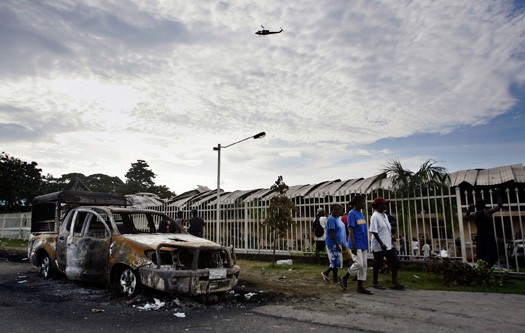NEW YORK, 13 February 2013 — The International Center for Transitional Justice (ICTJ) calls on the Prime Minister of the Solomon Islands, H.E. Gordon Darcy Lilo, to make the report of the Solomon Islands Truth and Reconciliation Commission (TRC) public without delay.
Almost one year since the TRC handed its final report to the prime minister, it has still not been publicly released, contrary to the law that established the commission.
The TRC was a pathbreaking effort to examine the armed conflict of 1998-2003 in the Solomon Islands by hearing directly from its many victims. During the conflict, now called “the tensions,” disputes over land ownership led militants to start attacking settlers, causing thousands to be displaced.
The commissioners worked hard to listen to all sides and identify patterns of discrimination, ethnic tension, and corruption at the root of abuses, some of which persists today. Their work, and the voices of thousands of victims who shared their stories, are the best hope for the Solomon Islands to move confidently toward reconciliation.
The 2008 Act establishing the TRC requires the prime minister to table the report before Parliament, make it public, and establish an independent authority to follow up on compliance with the report’s recommendations. None of these actions have taken place.
There are indications that the government is determined to delay publication of the comprehensive five-volume final report, or publish only selected portions of it, on the grounds that its contents are “sensitive.” However, silencing the report is contrary to the law and the internationally recognized right of victims to know the truth.
“There is no excuse for delaying the release of the TRC report,” says David Tolbert, president of ICTJ. “The citizens of the Solomon Islands have a fundamental right to know the truth. It is important for them as individuals and important for the society to show that it is a rights-respecting culture.”
The final report of a truth commission is an essential part of the truth-seeking process. The report will presumably contain findings about the root causes of the conflict, what happened during the conflict, what violations were suffered, and their impacts. Significantly, the report will share the commission’s recommendations for the future. These are part of an important road map for the healing of the nation.
ICTJ cooperated closely with the TRC, civil society organizations, and the international community during the tenure of the commission. ICTJ is committed to seeing the process of truth through, and calls on the government to act consistently with the TRC Act, release the report, and ensure it is debated seriously and its recommendations are followed.
“The alleged sensitivity of the final report is not a reason to suppress it. On the contrary, it is precisely because of the painful nature of the facts likely described in the report that the text must be released in its entirety,” declares Eduardo González-Cueva, director of ICTJ’s Truth and Memory program. “Otherwise, the country will stay in the dark, trapped in a culture of silence and government opacity.”
About ICTJ
The International Center for Transitional Justice (ICTJ) works to redress and prevent the most severe violations of human rights by confronting legacies of mass abuse. ICTJ seeks holistic solutions to promote accountability and create just and peaceful societies. For more information, visit www.ictj.org.
Contact
New York: Refik Hodzic, Director of Communications E-mail: rhodzic@ictj.org Phone: +1 917 975 2286
PHOTO: April 20, 2006- Solomon Islanders walk past a burned out police car outside a destroyed casino in Honiara April 20, 2006. REUTERS/Tim Wimborne
